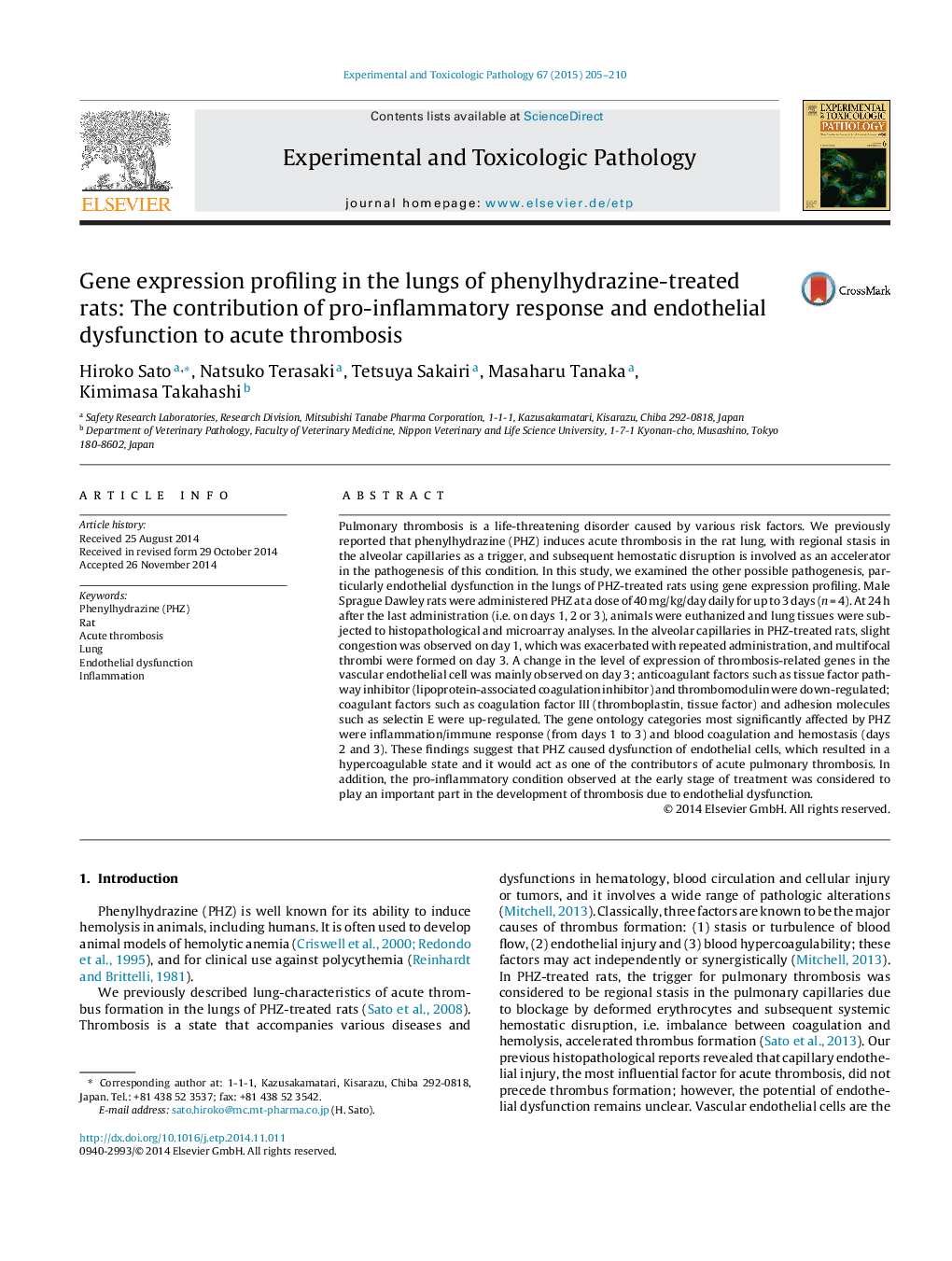| کد مقاله | کد نشریه | سال انتشار | مقاله انگلیسی | نسخه تمام متن |
|---|---|---|---|---|
| 5817059 | 1116465 | 2015 | 6 صفحه PDF | دانلود رایگان |
عنوان انگلیسی مقاله ISI
Gene expression profiling in the lungs of phenylhydrazine-treated rats: The contribution of pro-inflammatory response and endothelial dysfunction to acute thrombosis
ترجمه فارسی عنوان
پروفیل سازی بیان ژن در ریه های موشهای تحت درمان با فنیل هیدرازین: نقش واکنش پرولاپلاسمی و اختلال عملکرد اندوتلیال در ترومبوز حاد
دانلود مقاله + سفارش ترجمه
دانلود مقاله ISI انگلیسی
رایگان برای ایرانیان
کلمات کلیدی
موضوعات مرتبط
علوم زیستی و بیوفناوری
علوم کشاورزی و بیولوژیک
علوم دامی و جانورشناسی
چکیده انگلیسی
Pulmonary thrombosis is a life-threatening disorder caused by various risk factors. We previously reported that phenylhydrazine (PHZ) induces acute thrombosis in the rat lung, with regional stasis in the alveolar capillaries as a trigger, and subsequent hemostatic disruption is involved as an accelerator in the pathogenesis of this condition. In this study, we examined the other possible pathogenesis, particularly endothelial dysfunction in the lungs of PHZ-treated rats using gene expression profiling. Male Sprague Dawley rats were administered PHZ at a dose of 40 mg/kg/day daily for up to 3 days (n = 4). At 24 h after the last administration (i.e. on days 1, 2 or 3), animals were euthanized and lung tissues were subjected to histopathological and microarray analyses. In the alveolar capillaries in PHZ-treated rats, slight congestion was observed on day 1, which was exacerbated with repeated administration, and multifocal thrombi were formed on day 3. A change in the level of expression of thrombosis-related genes in the vascular endothelial cell was mainly observed on day 3; anticoagulant factors such as tissue factor pathway inhibitor (lipoprotein-associated coagulation inhibitor) and thrombomodulin were down-regulated; coagulant factors such as coagulation factor III (thromboplastin, tissue factor) and adhesion molecules such as selectin E were up-regulated. The gene ontology categories most significantly affected by PHZ were inflammation/immune response (from days 1 to 3) and blood coagulation and hemostasis (days 2 and 3). These findings suggest that PHZ caused dysfunction of endothelial cells, which resulted in a hypercoagulable state and it would act as one of the contributors of acute pulmonary thrombosis. In addition, the pro-inflammatory condition observed at the early stage of treatment was considered to play an important part in the development of thrombosis due to endothelial dysfunction.
ناشر
Database: Elsevier - ScienceDirect (ساینس دایرکت)
Journal: Experimental and Toxicologic Pathology - Volume 67, Issue 2, February 2015, Pages 205-210
Journal: Experimental and Toxicologic Pathology - Volume 67, Issue 2, February 2015, Pages 205-210
نویسندگان
Hiroko Sato, Natsuko Terasaki, Tetsuya Sakairi, Masaharu Tanaka, Kimimasa Takahashi,
